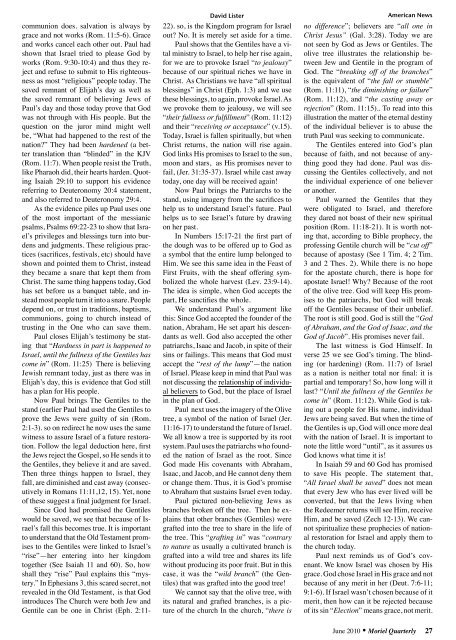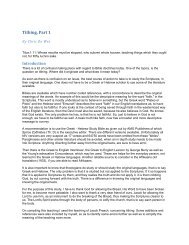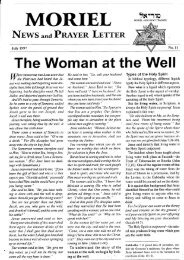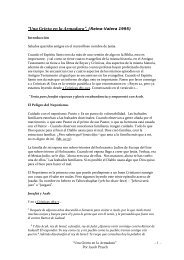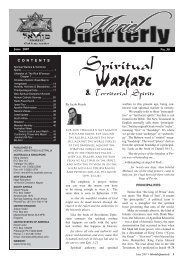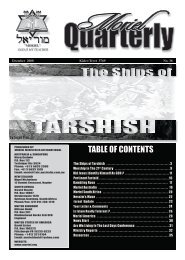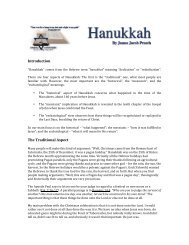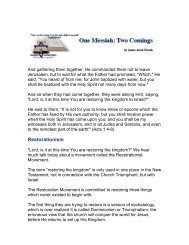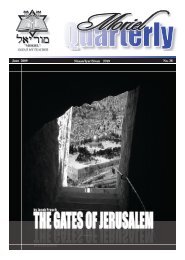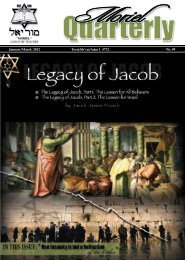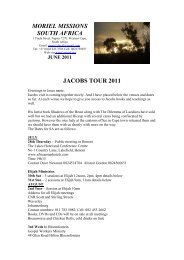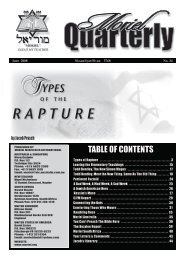T Y P O L O G Y of T H E IN THIS ISSUE:“ The ... - Moriel Ministries
T Y P O L O G Y of T H E IN THIS ISSUE:“ The ... - Moriel Ministries
T Y P O L O G Y of T H E IN THIS ISSUE:“ The ... - Moriel Ministries
Create successful ePaper yourself
Turn your PDF publications into a flip-book with our unique Google optimized e-Paper software.
communion does. salvation is always by<br />
grace and not works (Rom. 11:5-6). Grace<br />
and works cancel each other out. Paul had<br />
shown that Israel tried to please God by<br />
works (Rom. 9:30-10:4) and thus they reject<br />
and refuse to submit to His righteousness<br />
as most “religious” people today. <strong>The</strong><br />
saved remnant <strong>of</strong> Elijah’s day as well as<br />
the saved remnant <strong>of</strong> believing Jews <strong>of</strong><br />
Paul’s day and those today prove that God<br />
was not through with His people. But the<br />
question on the juror mind might well<br />
be, “What had happened to the rest <strong>of</strong> the<br />
nation?” <strong>The</strong>y had been hardened (a better<br />
translation than “blinded” in the KJV<br />
(Rom. 11:7). When people resist the Truth,<br />
like Pharaoh did, their hearts harden. Quoting<br />
Isaiah 29:10 to support his evidence<br />
referring to Deuteronomy 20:4 statement,<br />
and also referred to Deuteronomy 29:4.<br />
As the evidence piles up Paul uses one<br />
<strong>of</strong> the most important <strong>of</strong> the messianic<br />
psalms, Psalms 69:22-23 to show that Israel’s<br />
privileges and blessings turn into burdens<br />
and judgments. <strong>The</strong>se religious practices<br />
(sacrifices, festivals, etc) should have<br />
shown and pointed them to Christ, instead<br />
they became a snare that kept them from<br />
Christ. <strong>The</strong> same thing happens today, God<br />
has set before us a banquet table, and instead<br />
most people turn it into a snare. People<br />
depend on, or trust in traditions, baptisms,<br />
communions, going to church instead <strong>of</strong><br />
trusting in the One who can save them.<br />
Paul closes Elijah’s testimony be stating<br />
that “Hardness in part is happened to<br />
Israel, until the fullness <strong>of</strong> the Gentiles has<br />
come in” (Rom. 11:25) <strong>The</strong>re is believing<br />
Jewish remnant today, just as there was in<br />
Elijah’s day, this is evidence that God still<br />
has a plan for His people.<br />
Now Paul brings <strong>The</strong> Gentiles to the<br />
stand (earlier Paul had used the Gentiles to<br />
prove the Jews were guilty <strong>of</strong> sin (Rom.<br />
2:1-3). so on redirect he now uses the same<br />
witness to assure Israel <strong>of</strong> a future restoration.<br />
Follow the legal deduction here, first<br />
the Jews reject the Gospel, so He sends it to<br />
the Gentiles, they believe it and are saved.<br />
<strong>The</strong>n three things happen to Israel, they<br />
fall, are diminished and cast away (consecutively<br />
in Romans 11:11,12, 15). Yet, none<br />
<strong>of</strong> these suggest a final judgment for Israel.<br />
Since God had promised the Gentiles<br />
would be saved, we see that because <strong>of</strong> Israel’s<br />
fall this becomes true. It is important<br />
to understand that the Old Testament promises<br />
to the Gentiles were linked to Israel’s<br />
“rise”—her entering into her kingdom<br />
together (See Isaiah 11 and 60). So, how<br />
shall they “rise” Paul explains this “mystery.”<br />
In Ephesians 3, this scared secret, not<br />
revealed in the Old Testament, is that God<br />
introduces <strong>The</strong> Church were both Jew and<br />
Gentile can be one in Christ (Eph. 2:11-<br />
David Lister<br />
22). so, is the Kingdom program for Israel<br />
out? No. It is merely set aside for a time.<br />
Paul shows that the Gentiles have a vital<br />
ministry to Israel, to help her rise again,<br />
for we are to provoke Israel “to jealousy”<br />
because <strong>of</strong> our spiritual riches we have in<br />
Christ. As Christians we have “all spiritual<br />
blessings” in Christ (Eph. 1:3) and we use<br />
these blessings, to again, provoke Israel. As<br />
we provoke them to jealousy, we will see<br />
“their fullness or fulfillment” (Rom. 11:12)<br />
and their “receiving or acceptance” (v.15).<br />
Today, Israel is fallen spiritually, but when<br />
Christ returns, the nation will rise again.<br />
God links His promises to Israel to the sun,<br />
moon and stars, as His promises never to<br />
fail, (Jer. 31:35-37). Israel while cast away<br />
today, one day will be received again!<br />
Now Paul brings the Patriarchs to the<br />
stand, using imagery from the sacrifices to<br />
help us to understand Israel’s future. Paul<br />
helps us to see Israel’s future by drawing<br />
on her past.<br />
In Numbers 15:17-21 the first part <strong>of</strong><br />
the dough was to be <strong>of</strong>fered up to God as<br />
a symbol that the entire lump belonged to<br />
Him. We see this same idea in the Feast <strong>of</strong><br />
First Fruits, with the sheaf <strong>of</strong>fering symbolized<br />
the whole harvest (Lev. 23:9-14).<br />
<strong>The</strong> idea is simple, when God accepts the<br />
part, He sanctifies the whole.<br />
We understand Paul’s argument like<br />
this: Since God accepted the founder <strong>of</strong> the<br />
nation, Abraham, He set apart his descendants<br />
as well. God also accepted the other<br />
patriarchs, Isaac and Jacob, in spite <strong>of</strong> their<br />
sins or failings. This means that God must<br />
accept the “rest <strong>of</strong> the lump”—the nation<br />
<strong>of</strong> Israel. Please keep in mind that Paul was<br />
not discussing the relationship <strong>of</strong> individual<br />
believers to God, but the place <strong>of</strong> Israel<br />
in the plan <strong>of</strong> God.<br />
Paul next uses the imagery <strong>of</strong> the Olive<br />
tree, a symbol <strong>of</strong> the nation <strong>of</strong> Israel (Jer.<br />
11:16-17) to understand the future <strong>of</strong> Israel.<br />
We all know a tree is supported by its root<br />
system. Paul uses the patriarchs who founded<br />
the nation <strong>of</strong> Israel as the root. Since<br />
God made His covenants with Abraham,<br />
Isaac, and Jacob, and He cannot deny them<br />
or change them. Thus, it is God’s promise<br />
to Abraham that sustains Israel even today.<br />
Paul pictured non-believing Jews as<br />
branches broken <strong>of</strong>f the tree. <strong>The</strong>n he explains<br />
that other branches (Gentiles) were<br />
grafted into the tree to share in the life <strong>of</strong><br />
the tree. This “grafting in” was “contrary<br />
to nature as usually a cultivated branch is<br />
grafted into a wild tree and shares its life<br />
without producing its poor fruit. But in this<br />
case, it was the “wild branch” (the Gentiles)<br />
that was grafted into the good tree!<br />
We cannot say that the olive tree, with<br />
its natural and grafted branches, is a picture<br />
<strong>of</strong> the church In the church, “there is<br />
American News<br />
no difference”; believers are “all one in<br />
Christ Jesus” (Gal. 3:28). Today we are<br />
not seen by God as Jews or Gentiles. <strong>The</strong><br />
olive tree illustrates the relationship between<br />
Jew and Gentile in the program <strong>of</strong><br />
God. <strong>The</strong> “breaking <strong>of</strong>f <strong>of</strong> the branches”<br />
is the equivalent <strong>of</strong> “the fall or stumble”<br />
(Rom. 11:11), “the diminishing or failure”<br />
(Rom. 11:12), and “the casting away or<br />
rejection” (Rom. 11:15).. To read into this<br />
illustration the matter <strong>of</strong> the eternal destiny<br />
<strong>of</strong> the individual believer is to abuse the<br />
truth Paul was seeking to communicate.<br />
<strong>The</strong> Gentiles entered into God’s plan<br />
because <strong>of</strong> faith, and not because <strong>of</strong> anything<br />
good they had done. Paul was discussing<br />
the Gentiles collectively, and not<br />
the individual experience <strong>of</strong> one believer<br />
or another.<br />
Paul warned the Gentiles that they<br />
were obligated to Israel, and therefore<br />
they dared not boast <strong>of</strong> their new spiritual<br />
position (Rom. 11:18-21). It is worth noting<br />
that, according to Bible prophecy, the<br />
pr<strong>of</strong>essing Gentile church will be “cut <strong>of</strong>f”<br />
because <strong>of</strong> apostasy (See 1 Tim. 4; 2 Tim.<br />
3 and 2 <strong>The</strong>s. 2). While there is no hope<br />
for the apostate church, there is hope for<br />
apostate Israel! Why? Because <strong>of</strong> the root<br />
<strong>of</strong> the olive tree. God will keep His promises<br />
to the patriarchs, but God will break<br />
<strong>of</strong>f the Gentiles because <strong>of</strong> their unbelief.<br />
<strong>The</strong> root is still good. God is still the “God<br />
<strong>of</strong> Abraham, and the God <strong>of</strong> Isaac, and the<br />
God <strong>of</strong> Jacob”. His promises never fail.<br />
<strong>The</strong> last witness is God Himself. In<br />
verse 25 we see God’s timing. <strong>The</strong> blinding<br />
(or hardening) (Rom. 11:7) <strong>of</strong> Israel<br />
as a nation is neither total nor final: it is<br />
partial and temporary! So, how long will it<br />
last? “Until the fullness <strong>of</strong> the Gentiles be<br />
come in” (Rom. 11:12). While God is taking<br />
out a people for His name, individual<br />
Jews are being saved. But when the time <strong>of</strong><br />
the Gentiles is up, God will once more deal<br />
with the nation <strong>of</strong> Israel. It is important to<br />
note the little word “until”, as it assures us<br />
God knows what time it is!<br />
In Isaiah 59 and 60 God has promised<br />
to save His people. <strong>The</strong> statement that,<br />
“All Israel shall be saved” does not mean<br />
that every Jew who has ever lived will be<br />
converted, but that the Jews living when<br />
the Redeemer returns will see Him, receive<br />
Him, and be saved (Zech 12-13). We cannot<br />
spiritualize these prophecies <strong>of</strong> national<br />
restoration for Israel and apply them to<br />
the church today.<br />
Paul next reminds us <strong>of</strong> God’s covenant.<br />
We know Israel was chosen by His<br />
grace. God chose Israel in His grace and not<br />
because <strong>of</strong> any merit in her (Deut. 7:6-11;<br />
9:1-6). If Israel wasn’t chosen because <strong>of</strong> it<br />
merit, then how can it be rejected because<br />
<strong>of</strong> its sin “Election” means grace, not merit.<br />
June 2010 • <strong>Moriel</strong> Quarterly 27


